constituent assembly of india debates (proceedings)- volume vii
constituent assembly of india debates (proceedings)- volume vii
constituent assembly of india debates (proceedings)- volume vii
Create successful ePaper yourself
Turn your PDF publications into a flip-book with our unique Google optimized e-Paper software.
partially excluded areas <strong>of</strong> Orissa, we came across tribals who had not been anywhere beyond a few<br />
miles <strong>of</strong> their village or seen a motor car or a railway train. By and large however we found that there is<br />
a considerable demand for education and advancement among the tribal peoples and have no doubt that<br />
within a short time they can be brought up to a satisfactory level, if development plans are vigorously<br />
pursued.<br />
8. GENERAL CONCLUSIONS -<br />
To sum up: Both exclusion and partial exclusion have not yielded much tangible result in taking the<br />
aboriginal areas towards removal <strong>of</strong> that condition or towards economic and educational betterment.<br />
Representation <strong>of</strong> partially excluded areas in the legislature and in local bodies has been weak and<br />
ineffective and is likely to continue to be so for some time to come. Education shows definite signs <strong>of</strong><br />
being sought after more and more but the poor economic condition <strong>of</strong> the aboriginal and the difficulty <strong>of</strong><br />
finding suitable teachers present problems which must be overcome before illiteracy can be properly<br />
tackled. The great need <strong>of</strong> the aboriginal is protection from expropriation from his agricultural land and<br />
virtual serfdom under the money-lender.<br />
There are certain tracts like Sambalpur and Angul in the Orissa province which need no longer be<br />
treated differently from the regularly administered districts. On the other hand areas like the Madras and<br />
the Orissa Agency tracts still need a simplified type <strong>of</strong> administration which does not expose them to the<br />
complicated machinery <strong>of</strong> ordinary law courts. Differences in social customs and practices among the<br />
tribes also need to be kept in mind.<br />
9. REPRESENTATION IN LEGISLATURES -<br />
We have pointed out at the very outset that the tribals who live in non-excluded areas form part <strong>of</strong><br />
our problem and cannot be left out <strong>of</strong> account. In considering representation in the Legislatures we<br />
would urge that the tribes should be treated as a whole as a minority and not separately. In this regard,<br />
we would refer to a certain difference <strong>of</strong> opinion which exists among the parties interested. In Bombay<br />
the view <strong>of</strong> the Ministers and others dealing with the problem was unreservedly in favour <strong>of</strong> providing<br />
representation for the tribes as a whole by reservation <strong>of</strong> seats in a joint electorate. In Madras also a<br />
similar view found fav our. In the Central Provinces, however, different views were expressed not only in<br />
respect <strong>of</strong> the method <strong>of</strong> election but also about reservation, both by <strong>of</strong>ficials and by Ministers. Certain<br />
district <strong>of</strong>ficials suggested that there should be nomination out <strong>of</strong> a panel submitted by district <strong>of</strong>ficials.<br />
Mr. Grigson favoured a scheme <strong>of</strong> indirect elections by means <strong>of</strong> group panchayats. The general feeling<br />
among these <strong>of</strong>ficials was that election was not likely in the present circumstances to produce suitable<br />
representatives. Some point was given to this by the reply <strong>of</strong> Mr. Wadiwa, a Gond pleader, who gave<br />
evidence before us, that he could not stand for election on account <strong>of</strong> the expense involved. The<br />
Ministers on the contrary seemed to have no objection to elections but were strongly opposed to<br />
reservation <strong>of</strong> seats in proportion to their population. Mr. Grigson also did not appear to favour<br />
reservation though he was <strong>of</strong> the view that if reservation was made for the scheduled castes there was<br />
no justification for not protecting the aboriginal similarly: "But once we start with reservation there is the<br />
possibility <strong>of</strong> it becoming permanent." The Ministers considered that increased representation would be<br />
provided by their scheme <strong>of</strong> demarcating constituencies without the evil <strong>of</strong> creating a separatist<br />
mentality. "These tahsil areas will be delimited so that particular communities in particular areas will get<br />
an effective voice. Just as particular wards in a municipality return only a particular class or community<br />
<strong>of</strong> persons - some wards in Nagpur Municipality return only Muslim members - an Ahir ward or tahsil will<br />
return only an Ahir, a Gond tahsil will return only a Gond and so on. In this way we want to give all the<br />
sections <strong>of</strong> our people thorough and complete representation without whetting their communal appetite."<br />
As regards the other tribals who are not found in compact areas, it is asserted that they are generally<br />
dispersed in the province and not easily distinguishable from the other people. In Orissa reservation <strong>of</strong> "a<br />
specific number <strong>of</strong> seats" in general constituencies is recommended but it is considered necessary that


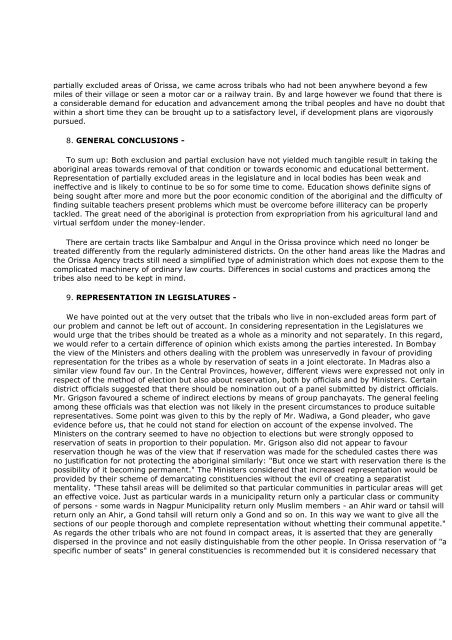
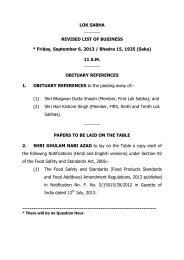
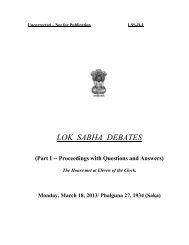
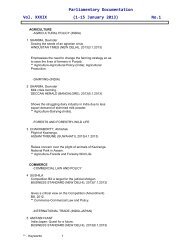
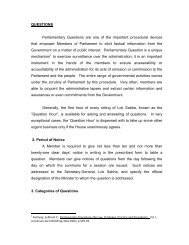
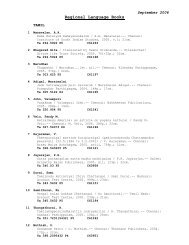
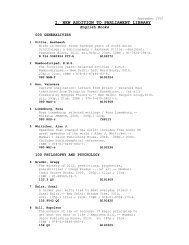
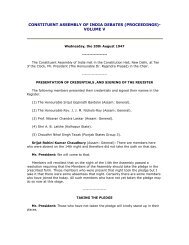
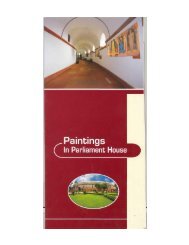
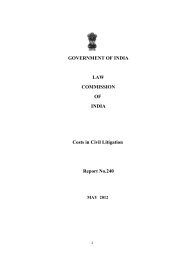
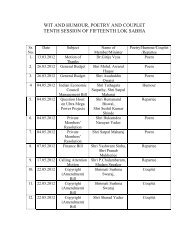
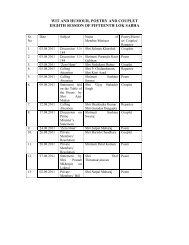

![gÉÉŌ A.]ÉŌ. xÉÉxÉÉ](https://img.yumpu.com/8015720/1/190x245/geeo-aeo-xeexee.jpg?quality=85)
